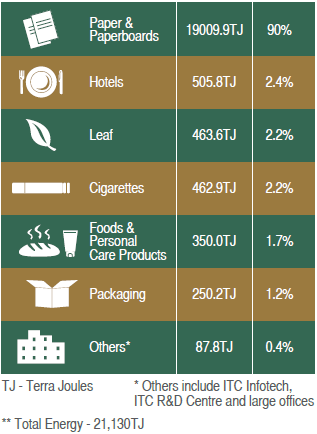Environmental Performance
Climate Change and Sustainable Development
 Minimising Carbon Intensity and Adopting a Low Carbon Growth Path
Minimising Carbon Intensity and Adopting a Low Carbon Growth Path
| Energy consumption within ITC across businesses (2011-12) |  |
 |
|
|
A focused approach on energy
conservation through rigorous third
party audits and
implementation of the recommendations resulted in substantial improvement in specific energy performance
|
|
Black liquor waste from pulping process in the Bhadrachalam Paperboards Unit.
Waste wood biomass from chipping operations.
Locally sourced chip/sawdust and de-oiled bran as boiler fuel in Kovai.
Wind energy farms for Packaging & Printing, Cigarettes and Hotels Businesses.
Solar thermal systems for preheating boiler feed water and canteen hot water in a number of our Units.
Specific energy consumption (GJ/tonnes): Bhadrachalam

Progress in reduction of specific energy consumption in ITC's Businesses
 A focused approach on energy conservation through rigorous third party audits and implementation of the recommendations resulted in substantial improvement in specific energy performance.
A focused approach on energy conservation through rigorous third party audits and implementation of the recommendations resulted in substantial improvement in specific energy performance.
In the Paperboards and Specialty Papers Business, the three factories, Bhadrachalam, Tribeni and Kovai together accounted for 89.7% of total energy consumption for ITC. ITC’s Paperboards and Specialty Papers Business has been rated as the most energy efficient in the Indian Paper and Paperboard business sector, according to the Centre for Science and Environment, New Delhi (Challenge of the New Balance, CSE, 2010).
In 2011-12, the Paper & Paperboards Unit at Bhadrachalam significantly reduced its specific energy consumption by 12% over the last year, as illustrated above. This is a noteworthy achievement as this Unit alone accounts for 71% of total energy consumption in ITC. Tribeni Specialty Papers Unit also reduced the energy used per tonne of paper by 3.8 % over the last year.
The Cigarettes Business in 2011-12 utilised 5.28 GJ of energy per million cigarettes (equivalent) compared to 6.5 GJ per million cigarettes in 2010-11, a reduction of 18.8% over the previous year. The cigarette manufacturing Unit of ITC at Pune reduced its specific energy consumption from 4.92 to 3.29 GJ per million cigarettes (equivalent), a reduction of 33.1% over the previous year. The largest cigarette manufacturing Unit of ITC at Bengaluru also reduced its specific energy consumption from 9.59 to 6.75 GJ per million cigarettes (equivalent), a reduction of 29.6% over the previous year. Both these are comparable with international benchmarks on specific energy consumption for cigarettes business.
There has been a substantial improvement in the specific energy consumption at the Soap and Shampoo Units at Manpura of the Personal Care Products Business and the Snacks Units of the Foods Business in Haridwar and Pune, as illustrated below:
| Business | Unit | Product | 2010-11 (GJ/Tonnes) |
2011-12 (GJ/Tonnes) |
Percentage |
| Personal Care | Manpura | Shampoo | 175.63* | 115.18* | 34.4 |
| Personal Care | Manpura | Soap | 2.23 | 1.30 | 41.6 |
| Foods | Haridwar | Snacks | 5.19 | 4.33 | 16.6 |
| Foods | Pune | Snacks | 8.83 | 6.73 | 23.8 |
GJ/KL